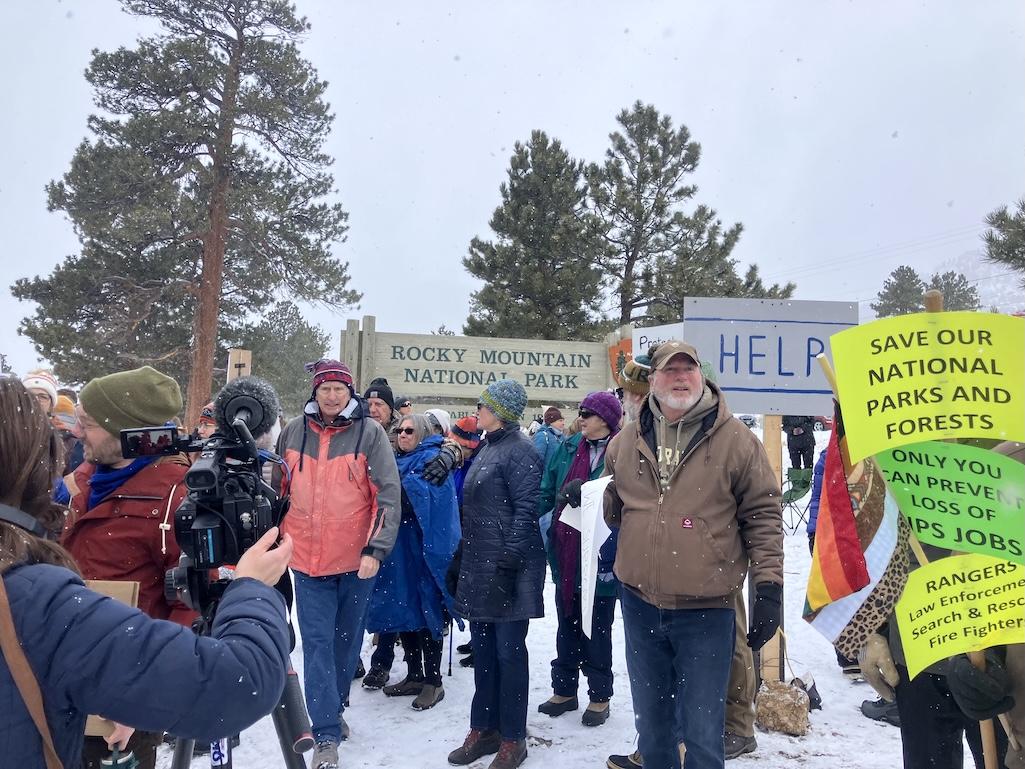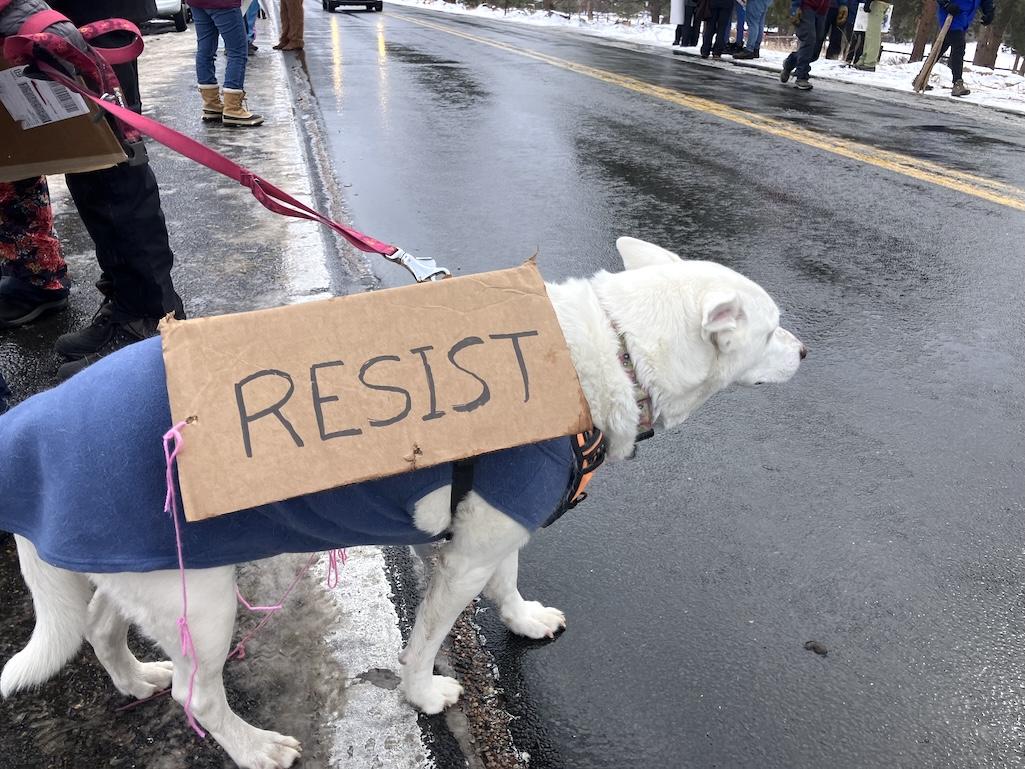
A crowd gathered at the Beaver Meadows entrance to Rocky Mountain National Park to protest cuts to the National Park Service/Adam Auerbach
Earlier this week I did something I thought I would never in my lifetime have to do. I traveled to my former workplace, Rocky Mountain National Park’s Beaver Meadows entrance, the gateway to one of the most magnificent places on Earth, to protest.
To protest against the evil and downright stupidity that is the firing of so many of my hardworking former colleagues. As a former ranger, the Beaver Meadows entrance and visitor center is the site of many memories:
- Beaver Meadows is where, in 2016, I first entered the park that would become my home. Where it became real that, after years of work (AmeriCorps, volunteer work, internships, a degree), my dream of becoming a national park ranger had been realized.
- Is where I nervously gave my first ever ranger program, about bears, to an excited and gracious American public.
- Is where I swore in countless Junior Rangers, the next generation of the American public.
- Where I answered repeated questions about parking and the nearest bathroom (despite the nearby sign) until my head ached and my throat hurt, for you the American public.
- Where I, on occasion, cleaned those very bathrooms, even though it was not a part of my job (we were even then understaffed), for you the American public.
- Where I politely but firmly discouraged many a flip-flop wearing tourist from the thought that they would hike Longs Peak, at over 14,000 feet, that very afternoon, the day after flying in from sea level. In their flip-flops. To protect the American public.
- Where I co-created thousands of itineraries that undoubtedly led to lifelong memories in the park for the American public.
- Where I gladly served hundreds of visitors in their distinctive red hats, because everyone loves and deserves access to our parks, all members of the American public.

Adam Auerbach photo
And on this day, President’s Day, a new memory was created. Hundreds, in a small rural community, braving freezing temperatures and snow to create a massive outpouring of support for our park rangers and public lands managers. The American public returning the favor. Even bigfoot was there.
Now, read this part closely.
Here’s what you probably already know:
On Friday, Valentine’s Day, thousands of dedicated civil servants across our public lands agencies were fired, including 1,000 from the National Park Service, 3,400 from the U.S. Forest Service, and thousands more across agencies like the U.S. Fish and Wildlife Service and Bureau of Land Management.
Losing your job sucks.
Here’s what you probably don’t already know:
In addition to losing their jobs, many of these hardworking people lost their homes, as many park, forest, and wildlife refuge employees live on-site in government housing. So now, not only are they without work, they are also without a place to live.
Getting a permanent job with an agency like the NPS is damn hard. This path usually requires years of volunteer work and poorly paid seasonal jobs, challenging working conditions, extremely physically demanding work, a degree, moving across the country as needed, a lack of stability, and a lot of luck. My heart breaks for my colleagues who sacrificed, in blood, sweat, and tears, to serve the public, and finally made it in, realized the dream, and secured one of those highly coveted permanent jobs with the NPS. Or so they thought.
Our parks, forests, and wildlife refuges were already wildly understaffed. The NPS, for example, sees 40 million more visitors annually than in 2010, but with a staff of thousands fewer rangers across the system.
NPS employees are not who you might think of when you think of federal employees. Common perception is that feds are pencil-pushing bureaucrats in DC, elite and out of touch. And while I don’t whatsoever wish any harm on these people either and believe in the importance of a professional, nonpartisan civil service, our public land managers are different. Our park, forest, and refuge rangers are veterans (roughly 20% for the NPS). They are plow operators. They are maintenance folks and mechanics. They are wildfire professionals. They are sawyers. They are trail-builders. They are medics and first responders. They are educators. They are law enforcement. They all accept much lower pay than they could command almost anywhere else to serve you. They are me only a few years ago.
The mass firings are almost certainly illegal. All probationary employees were fired, which includes people who recently secured their first permanent job with the agency or who recently took on a new role. The law is clear that in the probationary period, such folks can be fired for poor performance. However, it is obviously not the case that 100 percent of probationary staff across agencies were low performers. In my experience, public land managers are amongst the most dedicated and competent professionals.
These firings won’t save the American taxpayer any money. Our public lands are the backbone of the U.S.’s outdoor recreation economy, a $1.2 trillion industry. That’s right trillion with a “T.” 3.1 percernt of national employment. 2.3 percent of GDP. A sector three times as large as auto and air transport manufacturing and larger than oil, gas, and mining combined. In my home state of Colorado, the industry provides 511,000 direct jobs, including every job I’ve held. Public lands and the jobs they provide are the backbone of many rural economies, including for communities like Estes Park, a community of roughly 6,000, where I used to live. So when we attack our parks and our park rangers, we also attack so many other rural professions. Tour guiding. Restaurants. Rental services. Hotels. Gear shops and other small businesses. Assuming an average salary of $70,000, firing 1,000 park rangers saves $70 million, or roughly 0.0001 percent of the $6.9 trillion the federal government spent in fiscal year 2024, which pales in comparison to the currently proposed trillions of dollars in tax cuts for the wealthy. Regardless, a large part of my graduate study has been around the economic benefits of public lands and recreation, and I tell you with full confidence that the economic harm of slashing staffing at our public lands agencies will far outweigh any microscopically small tax benefits.

Adam Auerbach photo
Here’s what they don’t want you to know:
Does it seem like these firings don’t make sense? They’re not supposed to. What they are meant to do is to traumatize our hardworking civil servants. Russel Vought, a primary architect of Project 2025 and the current Director of the U.S. Office of Management and Budget is quoted as wanting to break the spirit of our civil servants. “We want the bureaucrats to be traumatically affected… When they wake up in the morning, we want them to not want to go to work because they are increasingly viewed as the villains… We want to put them in trauma.” This is the real reason for these reckless, illegal, and unwarranted firings; to traumatize those who remain.
This is almost certainly part of a concerted effort to sell off our public lands, our wondrous shared natural heritage. A right-wing fringe agenda has long been transferring our federal public lands to the states and in turn to private interests. The best tactic for furthering this goal is to cripple our public lands agencies by depleting them of staff and funding to the point where the public is convinced the government cannot tend to these places and they simply must be privatized. Continue to watch this one very closely, there has been momentum building around this previously fringe agenda in Utah and Wyoming in particular of late.
This is the most insidious piece, and one I have not seen acknowledged or written about anywhere else: gutting our public lands agencies is part of the ongoing project of re-shaping the American mind and values. A recent executive order seeks to remodel how we teach history in this country, and limit discourse on America’s past and present to only acknowledge the patriotic and good. The powers that be are seeking to prevent us from telling the many painful stories that also make up the fabric of our country: genocide and the theft of land from Native Americans, the enslavement of Africans, the internment of Japanese Americans, the quest for civil and human rights for so many marginalized communities. Not so coincidentally, these are all stories told in our national parks. Moreover, I have seen how time in our national parks, and particularly how experiences facilitated by rangers like me, can in fact foster within people a suite of values that is antithetical and dangerous to everything the current administration is trying to accomplish: empathy, wonder, connection to one’s fellow human and creature, compassion, stewardship, care for the natural world.
Vought, Musk, and Trump want to traumatize our rangers, but they will find that we are a much more resilient bunch than they could have ever imagined. But we need your help. And we need your help today. Everything I hear suggests that, without action, things may well get worse in short order through further attacks on our civil servants, so the time for mass mobilization is now. Do these things:
Call your congressperson and senators.
Tell you friends, family, and neighbors of all political persuasions what is being done to our parks, forests, and their protectors.
Donate money to advocacy and stewardship organizations if you can.
Be good responsible stewards of the land when you do visit our parks and forests going forward; there may well be no one to clean up after or rescue you.
Volunteer through a reputable stewardship organization. Do not however volunteer for a job a properly trained ranger used to do.
Thank and be kind to civil servants. Vought wants them to feel like the enemy; don’t let that happen.
Share this and/or any other coverage of this issue far and wide. Mass public awareness and media coverage of this issue is critical to prevent any further attacks on our parks, forests, and their stewards.

 Support Essential Coverage of Essential Places
Support Essential Coverage of Essential Places






